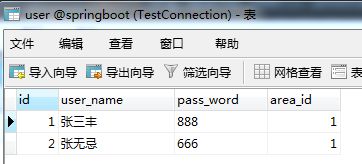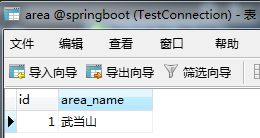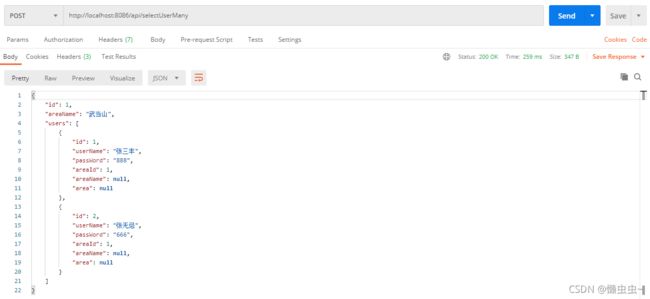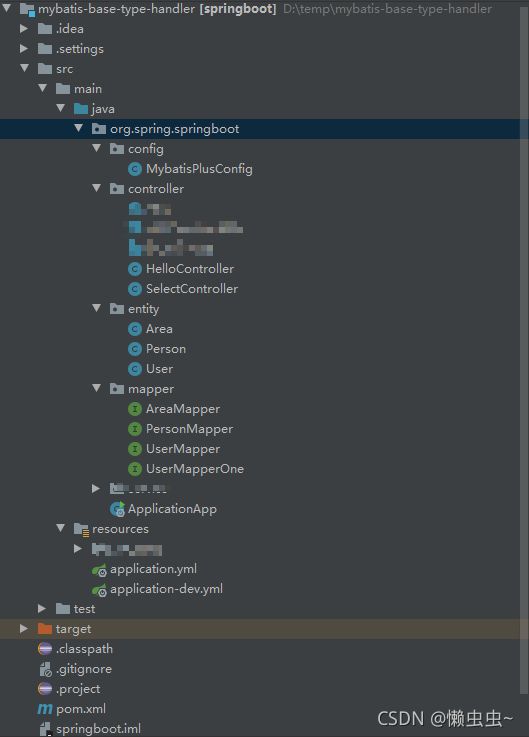SpringBoot整合Mybatis-Plus----多表关联查询(使用注解)
多表关联查询(使用注解)
- 一、创建两张表
- 二、编写实体类
- 三、使用 @One 注解实现一对一关联
- 四、使用 @Many 注解实现一对一关联
- 五、Controller层
- 六、测试
继续在 SpringBoot整合Mybatis-Plus 基础上修改项目
一、创建两张表
用户表(User)、区域表(Area),其中用户表里通过 area_id 字段关联区域表的 id 主键




二、编写实体类
User
package org.spring.springboot.entity;
import com.baomidou.mybatisplus.annotation.IdType;
import com.baomidou.mybatisplus.annotation.TableField;
import com.baomidou.mybatisplus.annotation.TableId;
import lombok.Data;
@Data
public class User {
//指定主键使用数据库ID自增策略
@TableId(type = IdType.AUTO)
private Integer id;
private String userName;
private String passWord;
private Integer areaId;
//由于 area_name 不是 User 数据库表里的字段,因此需要添加 @TableField 注解,并将 exist 属性设置为 false。
@TableField(exist = false)
private String areaName;
//假设我们需要查询一个区域及其下面的所有用户,首先对 Area 实体类稍作修改,增加 users 集合属性
@TableField(exist = false)
private Area area;
}
Area
package org.spring.springboot.entity;
import com.baomidou.mybatisplus.annotation.IdType;
import com.baomidou.mybatisplus.annotation.TableField;
import com.baomidou.mybatisplus.annotation.TableId;
import lombok.Data;
import java.util.List;
@Data
public class Area {
//指定主键使用数据库ID自增策略
@TableId(type = IdType.AUTO)
private Integer id;
private String areaName;
@TableField(exist = false)
private List<User> users;
}
三、使用 @One 注解实现一对一关联
UserMapper
package org.spring.springboot.mapper;
import com.baomidou.mybatisplus.core.mapper.BaseMapper;
import org.apache.ibatis.annotations.Mapper;
import org.apache.ibatis.annotations.Select;
import org.spring.springboot.entity.User;
import org.springframework.stereotype.Repository;
@Mapper
@Repository
public interface UserMapper extends BaseMapper<User> {
@Select("select user.* ,area.area_name from user,area "+
" where user.area_id = area.id and user.id = #{id}"
)
User getUserById(int id);
@Select("SELECT * FROM user WHERE area_id = #{areaId}")
User selectByAreaId(int areaId);
}
UserMapperOne
package org.spring.springboot.mapper;
import com.baomidou.mybatisplus.core.mapper.BaseMapper;
import org.apache.ibatis.annotations.*;
import org.spring.springboot.entity.User;
import org.springframework.stereotype.Repository;
@Mapper
@Repository
public interface UserMapperOne extends BaseMapper<User> {
//@Results 注解来映射查询结果集到实体类属性
/*
* 当我们需要通过查询到的一个字段值作为参数,去执行另外一个方法来查询关联的内容,而且两者是一对一关系时,可以使用 @One 注解来便捷的实现。
selectById 方法是 BaseMapper 就提供的,所以我们不需要在 AreaMapper 中手动定义。
@Result(column = "area_id", property = "areaId") 可以不写,也不会报错。但是会导致我们查询结果(User 实体)的 areaId 属性没有值(因为第二个 Result 将 area_id 值作为查询条件传入子查询)。
*/
@Results({
@Result(column = "area_id", property = "areaId"),
@Result(column = "area_id", property = "area",
one = @One(select = "org.spring.springboot.mapper.AreaMapper.selectById"))
})
@Select("SELECT * FROM user WHERE id = #{id}")
User getUserById(int id);
}
四、使用 @Many 注解实现一对一关联
AreaMapper
package org.spring.springboot.mapper;
import com.baomidou.mybatisplus.core.mapper.BaseMapper;
import org.apache.ibatis.annotations.*;
import org.spring.springboot.entity.Area;
import org.springframework.stereotype.Repository;
@Mapper
@Repository
public interface AreaMapper extends BaseMapper<Area> {
/*
@Many 的用法与 @One 类似,只不过如果使用 @One 查询到的结果是多行,会抛出 TooManyResultException 异常,这种时候应该使用的是 @Many 注解,实现一对多的查询。
@Result(column = "id", property = "id") 可以不写,也不会报错。但是会导致我们查询结果(Area 实体)的 id 属性没有值(因为第二个 Result 将 id 值作为查询条件传入子查询)。
*/
@Results({
@Result(column = "id", property = "id"),
@Result(column = "id", property = "users",
many = @Many(select = "org.spring.springboot.mapper.UserMapper.selectByAreaId"))
})
@Select("SELECT * FROM area WHERE id = #{id}")
Area getAreaById(int id);
}
五、Controller层
SelectController
package org.spring.springboot.controller;
import org.spring.springboot.entity.Area;
import org.spring.springboot.entity.User;
import org.spring.springboot.mapper.AreaMapper;
import org.spring.springboot.mapper.UserMapper;
import org.spring.springboot.mapper.UserMapperOne;
import org.springframework.beans.factory.annotation.Autowired;
import org.springframework.web.bind.annotation.RequestMapping;
import org.springframework.web.bind.annotation.RestController;
@RestController
@RequestMapping("/api")
public class SelectController {
@Autowired
UserMapper userMapper;
@Autowired
UserMapperOne userMapperOne;
@Autowired
AreaMapper areaMapper;
@RequestMapping("/selectUser")
public User test(){
User user = userMapper.getUserById(1);
return user;
}
@RequestMapping("/selectUserOne")
public User testOne(){
User user = userMapperOne.getUserById(1);
return user;
}
@RequestMapping("/selectUserMany")
public Area testMany(){
Area area = areaMapper.getAreaById(1);
return area;
}
}
六、测试
输入http://localhost:8086/api/selectUser

输入http://localhost:8086/api/selectUserOne

输入http://localhost:8086/api/selectUserMany

整体项目结构

参考文章
SpringBoot - MyBatis-Plus使用详解7(Mapper的CRUD接口4:多表关联查询)